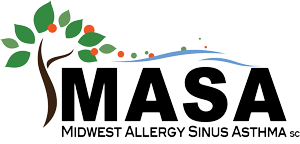
Back-to-school season is an exciting time for parents and many children who look forward to meeting new teachers and seeing their friends again after a long summer break. But, if your child has asthma and allergies, going back to school can also mean more exposure to irritants and triggers. Here at Midwest Allergy Sinus Asthma (MASA), with offices across Illinois, we specialize in treating patients of all ages with asthma and allergies.
To help you and your children have an easy transition into the new school year, we’ve put together some back-to-school tips for kids with asthma and allergies. Being aware and proactive can help everyone stay healthy, not just at the beginning of the new school year, but all year long. We’re happy to help you put these tips into practice, too.
Know your child’s asthma and allergy triggers
One of the best ways to minimize symptoms from allergies or asthma attacks is to know your child’s triggers. Going back to school may increase your child’s exposure to dust, foods, and air pollutants that they didn’t have to worry about while at home during summer vacation.
Additionally, as the fall season gets underway, many different types of tree and plant pollens become more prominent. In the Midwest, ragweed is a primary culprit for fall allergies. Most kids who have asthma also have allergies, which trigger asthma, so it can become a vicious cycle. When you know your child’s triggers, it’s easier to avoid them.
Common asthma triggers include:
- Animal dander
- Molds
- Pollens
- Dust mites
- Smoke
- Cleaning products and odors
- Cold, dry air
- Exercise
- Stress
Helping your child manage the daily stresses of a new routine during the first few weeks of getting back to school can also help manage their asthma.
Be prepared and proactive with medications
If your children have recess and physical education as part of their daily routine at school, be sure to have quick-relief medications on hand at the start of the school year. Don’t wait until prescriptions run out. Be sure to meet with the school nurse and fill out the necessary paperwork, so you can deliver asthma and allergy medications during your child’s open house or registration, sometime before the first day of school.
Reassure your child that they can participate in physical activity, indoors or outside, and should the need arise, the health clinic at school has their medication or inhaler on hand and easily accessible.
Stick to your child’s treatment plan
If your children regularly take preventive allergy or asthma medication, don’t wait until symptoms get worse to give it to them. Make sure they take their daily prescribed medications to prevent allergy flare-ups or asthma attacks while they’re at school.
Make the school aware of your child’s food allergies
It can be scary when your child isn’t home with you and has a severe food allergy. Make sure faculty and staff at your child’s school are fully informed about your child’s food allergies, and make sure teachers know what to do if a problem arises. Make sure your child knows what to do if they feel symptoms coming on, or are concerned they may have been exposed to their food allergy.
Meet with your child’s allergist to create an action plan
Don’t have an action plan in place yet? Before the new school year is fully underway and you’re entrenched in homework, play practice, and football games, meet with one of our highly skilled allergists. Together, you can create an action plan to help best manage your child’s allergies and asthma. Having an action plan in place can help both parents and kids feel reassured that they can handle an allergic reaction or asthma attack during school hours.
Give us a call at the MASA location closest to you, and we’ll help you get off to a great start this school year. You can also use the convenient online booking tool to request an appointment at any of our seven locations.
